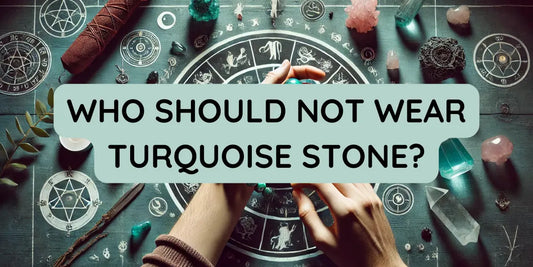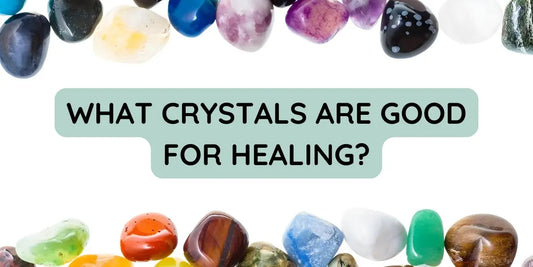Turquoise, a stone of a fascinating celestial blue, is one of the most prized gems in crystal healing and astrology. Renowned for its protective, spiritual and energetic properties, it is often worn to attract peace, luck and harmony. But despite its recognized benefits, turquoise is not suitable for everyone. Some people may experience adverse or incompatible effects when wearing it. In this article, we will explore who should not wear turquoise, and why it may be important to refrain from doing so.

Table of contents
Astrological signs incompatible with turquoise
People who are emotionally unstable or prone to anxiety
People working in dense energy environments
People who are not very receptive or skeptical of lithotherapy
Conclusion
Astrological signs incompatible with turquoise
Astrology plays a central role in the selection of stones according to the astral theme. Each stone is associated with certain astrological signs, and turquoise is no exception. Although it is suitable for signs such as Sagittarius, Pisces or Libra, it may be less favorable for other astrological profiles.

People born under the sign of Capricorn or Cancer, for example, may feel unbalanced when wearing this stone. For Capricorns, turquoise can exacerbate the need for control, creating emotional tension. For sensitive and emotional Cancers, this stone can stimulate an overly dynamic energy, causing excessive mental stimulation or sleep disturbances.
It is essential to consult a crystal expert or an astrologer before choosing a gemstone, as the wrong combination can create an energy block or accentuate negative personality traits. Wearing a turquoise without considering astrological compatibility can therefore have the opposite effect to that desired.
People who are emotionally unstable or prone to anxiety
Turquoise is a stone that has a strong effect on the throat and heart chakras. It stimulates communication, speaking out and openness to others. While these effects can be very positive in a balanced environment, they can be disruptive for people with emotional imbalances.

People suffering from chronic anxiety, emotional hypersensitivity or mood disorders should exercise caution. Turquoise, by amplifying the energies present, can accentuate the negative emotions already present. A stressed person might feel even more agitated or overwhelmed after wearing a turquoise.
In addition, some people may experience energy overload or physical ailments such as headaches, palpitations, or mental exhaustion. These are signals that the stone may not be suitable for your current emotional state. It is therefore recommended, in case of emotional distress, to start with softer stones such as labradorite, amethyst or lepidolite.
People working in dense energy environments
Some professions or work environments involve constant interaction with the energies of others: therapists, teachers, psychologists, caregivers, etc. In these contexts, wearing a stone that is too absorbent or too open, such as turquoise, can become an energy trap.

Although turquoise has protective properties, it is also a very porous stone in terms of energy. This means that it quickly absorbs surrounding energies. For someone who works daily in contact with heavy or negative energies, turquoise can quickly become “charged” and begin to release harmful vibrations.
This can lead to intense fatigue, mood swings, or a feeling of “blockage” in social interactions. It is therefore crucial to purify your stone very frequently, or to favor more neutral and robust stones such as tiger's eye, black tourmaline, or shungite in these situations.
People who are not very receptive or skeptical of lithotherapy
Finally, it is important to remember that stones act through energetic resonance, and that this resonance is influenced by the intention and receptivity of the person wearing it. A person who does not believe in lithotherapy, or who adopts a very skeptical attitude, can unconsciously block the beneficial effects of a stone such as turquoise.

In these individuals, not only can turquoise seem ineffective, but it can even cause adverse effects due to poor energy channeling. Wearing the stone then becomes a simple decorative piece of jewelry, with no energetic benefit.
But what's more, some non-receptive people may experience some form of physical or psychological discomfort (fatigue, headaches, unexplained nervousness) because their vibratory field is in resistance to that of the stone. In this case, it is therefore preferable to avoid powerful stones and to opt for in-depth work on energy alignment before introducing a stone such as turquoise.
Conclusion
Turquoise is a magnificent stone, rich in history and endowed with numerous spiritual and energetic benefits. But like all stones, it is not suitable for everyone. It is essential to take several criteria into account before wearing it: astrological compatibility, emotional state, energetic environment and personal receptivity.
If you recognize yourself in one of the profiles mentioned in this article, don't see it as a prohibition, but as an invitation to be cautious and to listen to your inner energy. Each stone has its own vibrations, and there is undoubtedly a gem made for you, even if it is not turquoise.
Don't forget that the most important thing when working with natural stones is intuition, feeling and respecting your own rhythm.

























